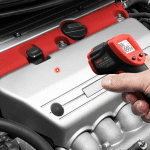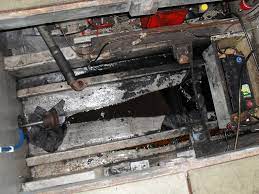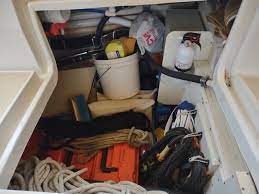When a mechanic comes onto a boat, most people want to watch over their shoulder to see what they are doing. In some cases, you may even want to jump in and help! Is this a good idea?
This depends a lot on your mechanic and your relationship with them. Many mechanics prefer NOT to have people watching over their shoulders. It is distracting and, given the close confines of most boats’ engine rooms, makes for uncomfortably close quarters. Frequently they are working on a running engine, around high amperage battery connections, or with sharp tools, and distractions can cause injury or damage.
You will have noticed that most auto repair shops do not allow customers in the work area unless accompanied and for a specific reason.

Your mechanic is a professional. Give them the space to do their job. If you are watching over them, they may get nervous, and that is when accidents happen. If you have questions, save them until the appropriate time when the mechanic takes a break or after the repair. Most mechanics will be more than happy to explain what they found, what they did, and perhaps how you can prevent the same issue from occurring in the future.
When a mechanic is working, especially on a complex boat system, they are typically very focused. An interruption breaks the train of thought, and it may take several minutes for them to get back to the place they were at. Remember, you are paying your mechanic by the hour. At $100+ per hour, your “quick question” may end up costing you an extra $50 in time, a couple of them in a row, and you could be spending hundreds more!
Sometimes it’s better NOT to know.

Would you want to watch your surgeon take out your appendix or a mortician embalm a loved one? Probably not. Your boat is your “loved one”! Many times it’s better just to let the mechanic get on with the work, and if you really want to know, ask when they are done.
You can do several things to help your mechanic and reduce the time spent on repairs and, ultimately, the final cost.
Be very specific about the issue and when it occurs.

Take time to do a little troubleshooting yourself. Take a sheet of paper and write down exactly when the issue occurs. If some event led up to the issue, tell your mechanic. Don’t be embarrassed to say, “Hey, I ran aground” or “I forgot to check the oil.” You’ll be more embarrassed when the mechanic finds what caused the problem (and they will), and you have to fess up later.
Do some preventative diagnostics
Keep track of your engine temperatures and oil pressure when your engine is running well. That way, you can communicate changes with your mechanic. Get a hand-held laser temperature gun. They are less than $20 on Amazon or at Harbor Freight. Take temperature readings around your engine from time to time and write them down. You should record the temperature of your exhaust manifold, alternator, water pump, around your cooling system cap, on your turbo if you have one, transmission, gearbox, and at each of your heat exchangers (water, air, oil, transmission), and at the exhaust elbow (right where it leaves the engine).

If you take these measurements when your engine is running normally and check them periodically, you can identify problems before they become major. It will also help your mechanic to diagnose where the issue might be.
If the problem is visual, like smoke from your exhaust, or audible, like a squeal or grinding noise, take a photo or a video with sound and provide it to your mechanic.
Your mechanic is working for you. They want to get the problem fixed quickly, so any information you can provide in advance will only help reduce the total time to repair.
Keep your boat clean.

Trying to find a leak in a dirty engine is next to impossible. If your mechanic has to take an hour to clean your engine or bilge just to find the source of a leak, that’s an extra hour you are paying for. Do regular cleaning on your engine, bilge, and areas around your pumps. It makes your engine room a much more hospitable place to work in and helps to identify issues much faster.
Suppose a mechanic sees an engine room covered in oil smudges, rust, and grime. He will be less likely to work cleanly. We always try to leave a work site better than we found it. If your engine and bilge are clean, we will leave it that way.
Remove the clutter!
There are many engine rooms that we have been in where the owner sees the space between the engines as a storage locker. First, engine rooms are for engines! Storing nonessential gear in the engine room is dangerous. If you get into some rough weather, items stored in the engine room can shift and get caught in moving parts. Fender lines get sucked into belts and pullies, and life jackets wrap around propeller shafts! Also, it creates a fire hazard. Keep non-essential items out of your engine room!

If you do store items in your engine room, make sure that you remove them before your mechanic arrives. If the mechanic is working on an air-conditioning system under a bed, remove the sheets and pillows, and if possible, remove the mattress or fold it up out of the way. Make their job as easy as possible. Remember, every minute that the mechanic spends shifting items to get to a work area is time you are paying for.
Remember why you called in a professional
When you go to your doctor, do you argue the diagnosis? When did you last tell your accountant how to do a tax return? Do you go to a lawyer because you are a legal expert?

It is quite common that we will explain to a boat owner what will be involved in diagnosing or fixing an issue, and they will argue with us, or worse, get mad at us because their boat broke! Your mechanic has (or should have) years of training and experience. We’ve seen pretty much everything several times over. Put your trust in your mechanic. If you can’t trust them, find another mechanic!
Yes, occasionally, we do get it wrong, and if your mechanic is a professional, they will make it right. Arguing or yelling at your mechanic won’t help get your boat fixed. Remember, it’s not your mechanics’ fault that your boat broke down. They are there to try and help you. Boats are complex systems that run in extreme conditions, and it’s an unfortunate fact of boat ownership that they break and are expensive to repair. (See our article “Why are boat repairs so expensive?”)
Work with your mechanic, not against them
Giving your mechanic the proper information, a clean environment to work in, and breathing space to do their job will go a long way toward keeping your maintenance and repair costs down. If you want to watch your mechanic, ask in advance. If they say no, please don’t be offended. They are just trying to work as efficiently and safely as possible.
Instead, ask them, “When you are done, can you spend a bit of time going over what you did?” any professional mechanic will be happy to accommodate.

